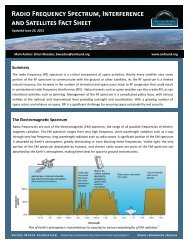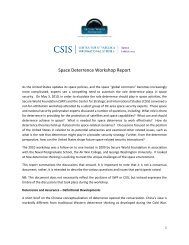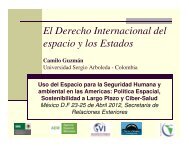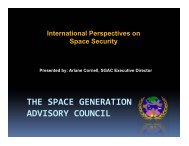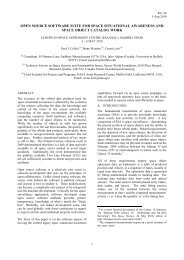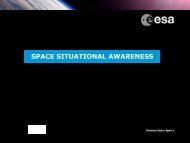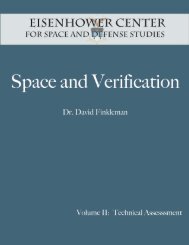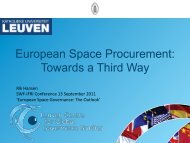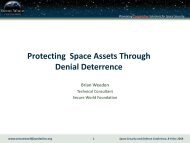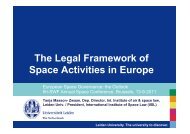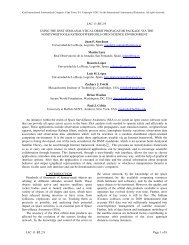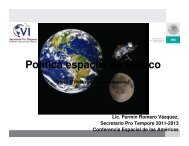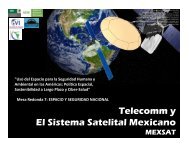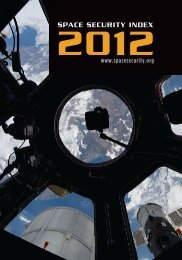Space Security Index
Space Security Index
Space Security Index
You also want an ePaper? Increase the reach of your titles
YUMPU automatically turns print PDFs into web optimized ePapers that Google loves.
2010 Developments:<br />
• Shift in U.S. National <strong>Space</strong> Policy toward increased international cooperation and responsible use of space, but<br />
domestic objectives face implementation problems<br />
• Despite initial delay, the U.S. <strong>Space</strong> Posture Review concludes with the release of the National <strong>Space</strong> <strong>Security</strong><br />
Strategy<br />
• The United Nations General Assembly establishes Group of Governmental Experts (GGE) to study transparency<br />
and confidence building measures in space<br />
• EU’s proposed international Code of Conduct for Outer <strong>Space</strong> Activities revised and ready for further international<br />
consultation<br />
<strong>Space</strong> <strong>Security</strong> Impact<br />
e new U.S. National <strong>Space</strong> Policy (NSP) signals that the U.S. is more open to dialogue<br />
and is committed to the responsible use of space. Because the actions and policies of the<br />
dominant space actor have a profound impact on the whole space environment, this<br />
development is welcome. However, some of the NSP declarations are vague and open to<br />
interpretation. e new policy could lead to real changes in the normative framework for<br />
outer space activities. However, the international dimension of the policy may have been<br />
overemphasized, if the lack of progress at the Conference on Disarmament (CD) and the<br />
First Committee is any evidence. Unlike Russia, China, and the EU, which have put forth<br />
specic proposals as the basis for further consultation on a multilateral regulatory regime for<br />
space activities, the U.S. has not assumed an active role by submitting a proposal of its own<br />
for the consideration of the international community.<br />
TREND 3.2: UN Committee on the Peaceful Uses of Outer <strong>Space</strong> (COPUOS)<br />
remains active as a forum for space governance, while CD deadlock persists<br />
— A range of international institutions, including the UN General Assembly, the UN Fist<br />
Committee, COPUOS, the ITU, and the CD, constitute the key multilateral forums to<br />
address issues related to space security. e adoption of a Program of Work at the CD in<br />
2009, after more than a decade of deliberations with no tangible results, could have allowed<br />
the CD to move forward on the Prevention of an Arms Race in Outer <strong>Space</strong> (PAROS) and<br />
to further discussions on a legal instrument to regulate space activities. But stalemate quickly<br />
resumed its grip. COPUOS remains active, with a principal focus on non-binding, technical<br />
approaches to security in space.<br />
2010 Developments:<br />
• The CD could not agree on a Program of Work, reverting to its pre-2009 deadlock<br />
• Progress in COPUOS as a working group emerges to take on the long-term sustainability of outer space activities<br />
<strong>Space</strong> <strong>Security</strong> Impact<br />
Renewed deadlock at the CD heightens recognition that the premier disarmament body<br />
in the UN system is not the appropriate forum to determine the issue of PAROS. But it<br />
also illustrates the larger problem of a near-universal lack of political will to resolve such an<br />
impasse. Despite the diculties, the acknowledgment by COPUOS of the need to liaise<br />
more closely with the CD and ITU on issues related to space safety is welcome.<br />
TREND 3.3: Formalized African cooperation in space increases — Recent<br />
cooperation agreements on space activities have allowed emerging spacefaring nations from<br />
Africa to reap social and economic benets from space applications. In 2009, after years<br />
of discussion, Nigeria, Algeria, South Africa, and Kenya signed a regional cooperation<br />
agreement for an African Resources Management Satellite (ARMS) Constellation. Following<br />
the launch of the South African National <strong>Space</strong> Agency in 2010, an inter-agency agreement<br />
Executive Summary<br />
15



